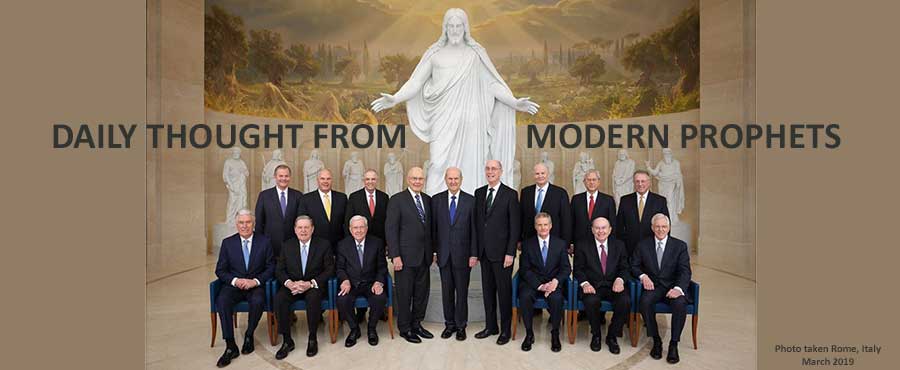President Thomas S. Monson (b. August 21, 1927) was sustained to the Quorum of Twelve Apostles in 1963. He served as a counselor in the First Presidency with Presidents Benson, Hunter, and Hinckley until becoming Church president in 2008.
"I made a few resolutions at the commencement of this new year. I’d like to share them with you, hoping that you, too, will join in making the same choices, the same resolutions.
"First in 1973, I will listen. Second, I will learn. Third, I will labor. And fourth, I will love. Four words beginning with the letter l, but four words which can well determine our destiny....
"Four pledges for the new year: I will listen, I will learn, I will labor, I will love. As we fulfill these pledges, we can have the guidance of our Heavenly Father and in our own lives experience true joy. Now, I don’t simply mean that we should make a wish, or that we should dream a dream, but rather determine to do that which we pledge to accomplish. We can, if we will. It was Henry Ford, the industrialist, who declared, 'Whether you think you can, or whether you think you can’t, you’re right.' Now, shall we go forward with such resolutions? Can we change our practices if such need changing? I declare that we can....
"I testify today that when the Savior spoke those words recorded in Revelation he was giving you and me counsel to help us be true to our pledge this new year. Remember his words? 'Behold, I stand at the door, and knock: if any man hear my voice, and open the door, I will come in to him' (Rev. 3:20). My prayer today is that we will have listening ears, that we might in turn hear his knock, appreciate the invitation of our Lord, and have the wisdom to open wide the doorway to our heart and the portals to our mind, that Jesus Christ might come in unto us. Shall we make room for him in our hearts? Shall we provide time for him in our lives? Once again the choice is yours, and the choice is mine, remembering that our choices, our decisions, determine our destiny."
- Thomas S. Monson, "A Time to Choose," BYU Devotional, January 16, 1973
Click here to read the full message
It's been almost 45 years since President Monson offered this counsel to BYU students at the start of a new year and a new semester in school. The vigor and enthusiasm of his message and challenges has not changed much over the years! He shared his personal goals with the students, and encouraged them to consider similar areas of growth in their own lives:
In the full text of the talk, President Monson goes into more detail for each of these four areas, giving more specifics about how improvement could occur and how it could be a blessing. It's very worth reviewing!
President Monson concludes with the reminder that divine assistance is available to us as we strive to change and grow. The Savior still stands at the door knocking, hoping that we will allow Him to enter our hearts and minds:
Perhaps the most important "resolution" of all would be to make sure we are opening that door more often and more fully!
(Compilation and commentary by David Kenison, Orem, Utah, 2017)

































